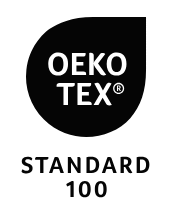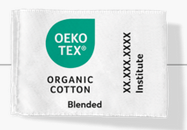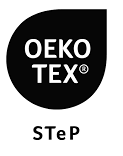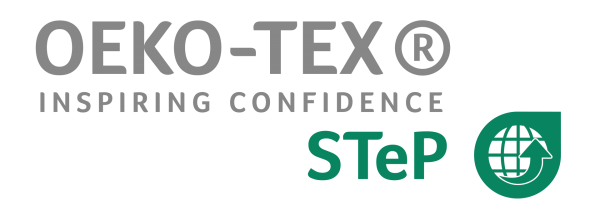Get to know your certifications: OEKO-TEX®
- Allana McGowan

- Aug 13
- 3 min read
What is OEKO-TEX®?
Oeko-Tex® is a globally recognised organisation that provides independent certifications and product labels for textiles and leather products.
It covers the following standards:
Standard 100: Certifies that textile products are free from harmful chemicals.
Organic Cotton: Offers verification from farm to product.
STeP (Sustainable Textile & Leather Production): Audits environmentally friendly and socially
responsible manufacturing practices.
ECO PASSPORT: Certifies chemicals used in textile production as safe.
MADE IN GREEN: A traceable label that combines safety (Standard 100) with sustainability (STeP).
We'll go through a few of these in more detail to get you better acquantied with what they are and what they cover.
OEKO-TEX® STANDARD 100
This is currently the most recognised certification and one you might already be familiar with.
In short standard 100 verifies the absence of harmful chemicals in textile products such as fabric and textile based trims. The goal around standard 100 is to protect consumers from health risks that could result from exposure to toxic substances.
The list of chemicals tested includes over 1,000 substances including: Azo dyes, Formaldehyde and heavy metals. Certifications are valid for 1 year, so in the case of a fabric supplier if they wish to continue using the standard 100 label, they would have to request a renewal/re-test to ensure continuous product safety and a smooth-running process along the entire textile chain. This should give you a good insight into why fabric suppliers are not keen to keep fabrics sitting around for long periods of time as renewals and re-testing incur further cost.
OEKO-TEX® STANDARD 100 LOGO's TO LOOK OUT FOR
Helpful Info: Fabric shops and distributors (i.e fabric vendors you might be buying from) often don't sort testing themselves, instead they'll try to work and buy from fabric mills who do and can supply them with certified fabrics. This is why you often have to dig a bit deeper to understand your true supply chain. This is important when gathering information for GPSR and future regulations such as ESPR and DPP's. Find our article on these here.
To continue your own research on OEKO-TEX® Standard 100 find the link here.
OEKO-TEX® ORGANIC COTTON
Products bearing this label use fabric and fibre grown and manufactured without the use of genetic modifications, they are tested for pesticides and other harmful substances. Certification for the fibre starts at farm level using IFOAM family of standards to prove organic cotton cultivation, this essentially means they trace the supply chain directly to the field. There are two organic cotton certified labels, 100% Organic Cotton and Minimum of 70% Organic Cotton (referred to as blended.)
It should be noted here that the label does not take into account social criteria (i.e workers rights etc) as it primarily focuses on organic origin, GMO & pesticide testing and chain-of-custody. But fundamental social criteria is addressed in the OEKO-TEX® Code of Conduct and full coverage of social criteria could be achieved by combining other certifications, I'll explain more about one of these below.
OEKO-TEX® ORGANIC COTTON LOGO's TO LOOK OUT FOR
To continue your own research on OEKO-TEX® Organic Cotton find the link here.
STeP (Sustainable Textile & Leather Production)
The OEKO-TEX® STeP certification establishes the highest standards for sustainable practices in textile and leather production, as well as industrial laundries. STeP stands for socially acceptable and safe working conditions and covers both environmental impact and social responsibility, ensuring safe, ethical, and eco-friendly operations.
It's a certification for all facility types in the entire textile and leather production, from fibre manufacturing to spinning or tanning to finishing and making-up.
OEKO-TEX® STeP LOGO's TO LOOK OUT FOR
To continue your own research on OEKO-TEX® STeP find the link here
Certification like Oeko-tex should be helpful to you as part of a sourcing strategy and as touched on above, are good for meeting the needs of legislation such as GPSR. It doesn't need to be the only thing you look at since these certifications are expensive to obtain they may not be viable for smaller businesses who are operating sustainably and ethically, so in this case it's better for you to go and see/understand the operations yourself.
Did you know our Wash Label ribbon quality is Okeo-Tex and GRS (Global Recycled Standard) Certified?
We then print on demand in house meaning our clients and customers can get the exact amount of labels and customisation they need with no overproduction necessary and you can order just 1pc!
We've received over 110, 5* reviews on Etsy alone for this service.














Western style has become more than just a trend—it’s a lifestyle. Fans of the Yellowstone series often want to dress like their favorite ranch characters, and one of the most sought-after pieces is the Yellowstone Jacket. Designed with durability, comfort, and rugged authenticity, this jacket allows anyone to carry the true cowboy spirit wherever they go.